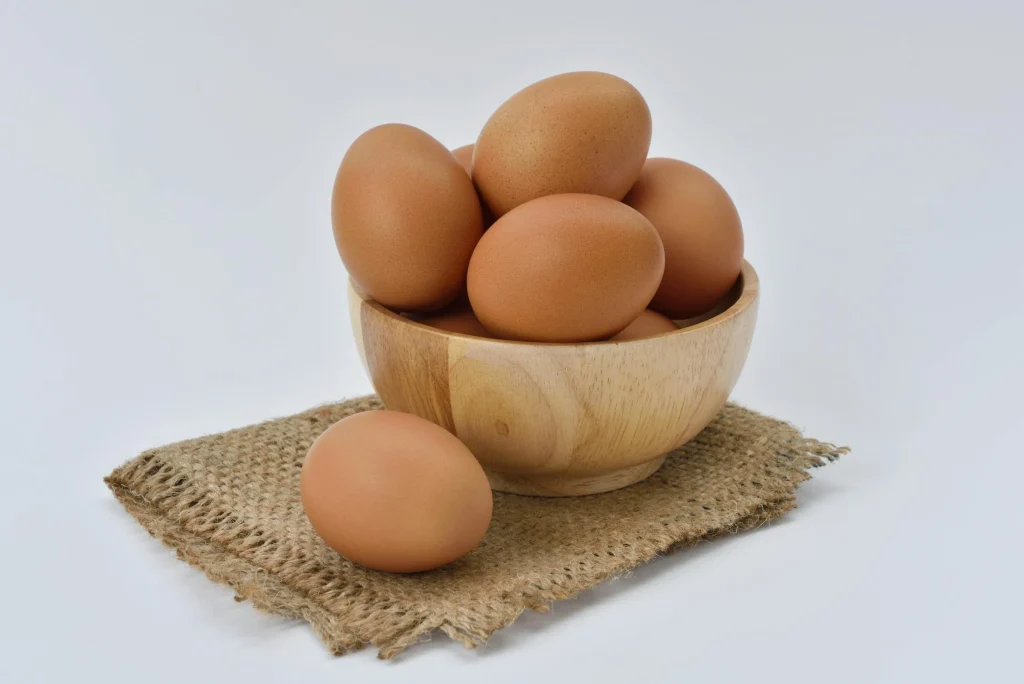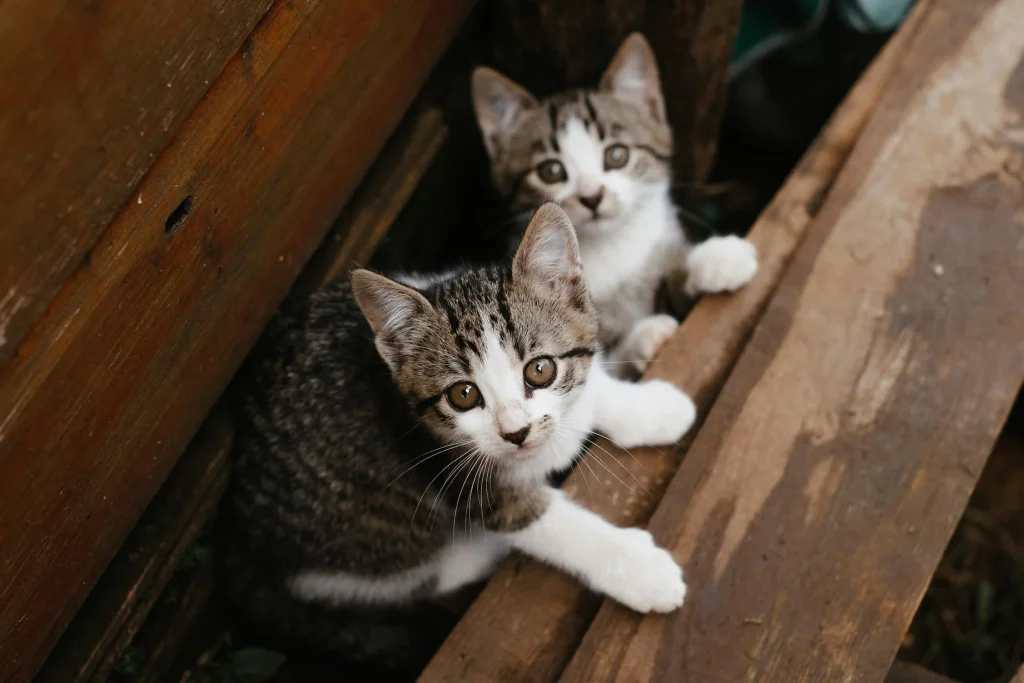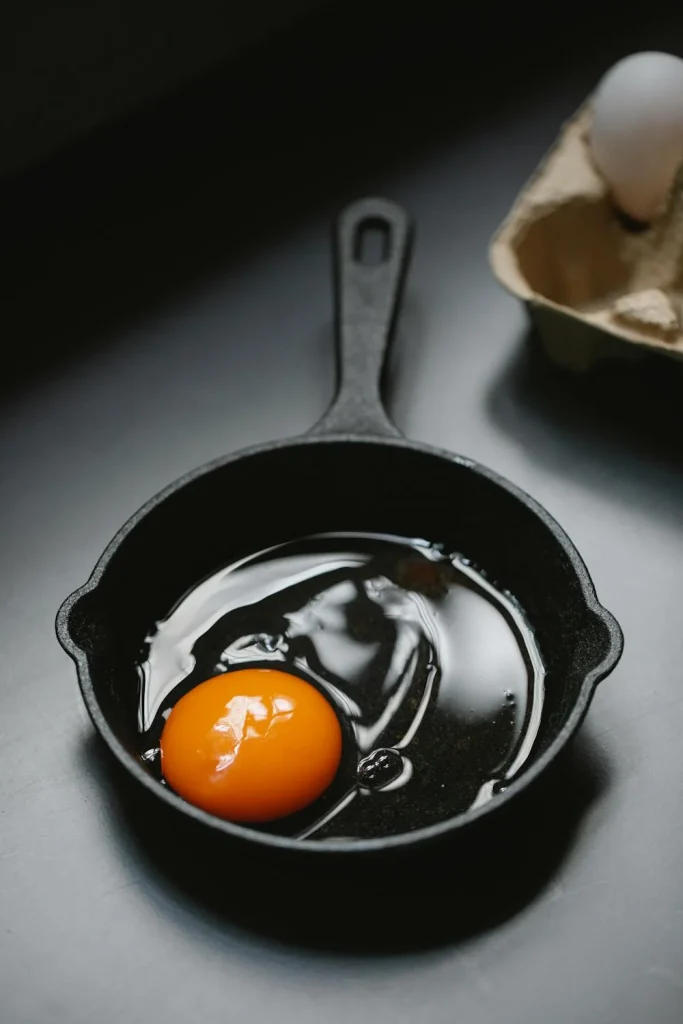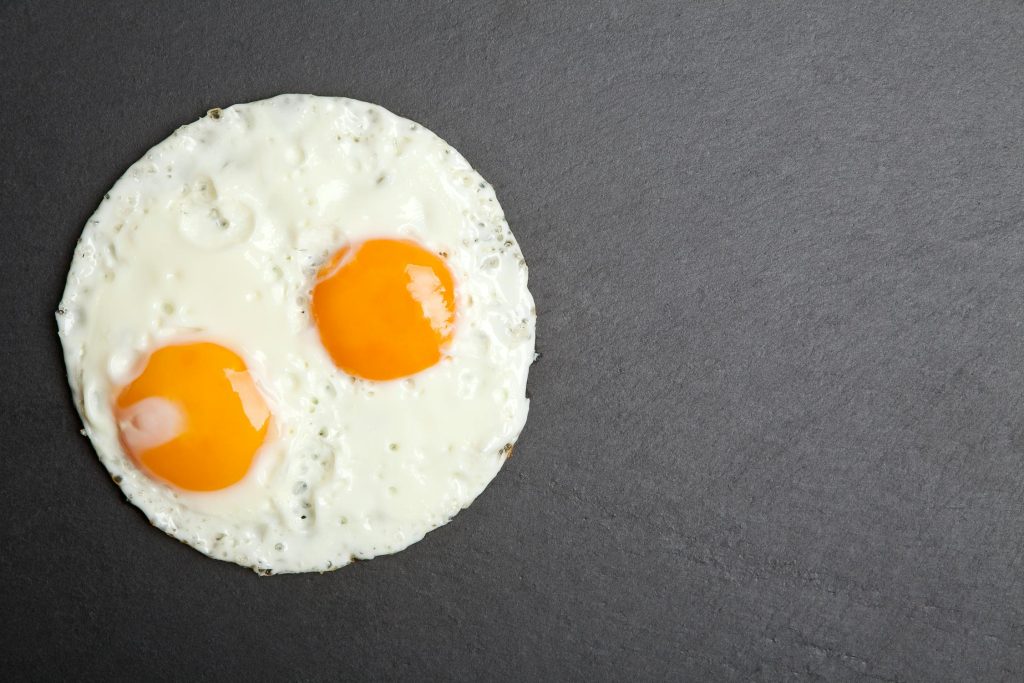Can cats eat eggs?
As a veterinarian, I’m often asked about feeding eggs to cats. In general, eggs can be a safe and nutritious treat for cats when prepared properly. Eggs are a good source of protein and contain essential amino acids that are beneficial for cats. They also provide vitamins like A, E, and B12, as well as minerals such as iron and selenium.

However, it’s important to remember that while eggs can be a nice occasional treat, they shouldn’t make up a large part of your cat’s diet. Cats have specific dietary requirements that are best met by high-quality commercial cat food formulated for their life stage. Read Also can cats eat coconut
When offering eggs to your cat, always make sure they’re cooked. Cooked eggs are easier for cats to digest and eliminate the risk of foodborne illnesses associated with raw eggs. A small amount of scrambled egg or a bit of hard-boiled egg can be a tasty snack for most cats.
As with any new food, introduce eggs slowly and in small amounts. Watch your cat for any signs of digestive upset or allergic reactions. If you notice any problems, discontinue feeding eggs and consult your veterinarian.
Are Eggs Safe for Cats to Consume
Eggs can be a safe and nutritious treat for cats when prepared properly. As a veterinarian, I often discuss egg consumption with cat owners, weighing both the benefits and risks. The key is moderation and proper preparation.
Cooked eggs are generally safe for cats. They’re rich in protein and contain essential amino acids that support your cat’s health. However, it’s crucial to serve eggs plain, without any added salt, seasonings, oils, or butter. These extras can be harmful to cats.
Raw eggs, on the other hand, pose significant risks. They may contain bacteria like Salmonella that can cause food poisoning. Additionally, raw egg whites contain a protein called avidin that can interfere with biotin absorption, potentially leading to skin and coat problems if consumed regularly. Read Also can cats eat mango
The cooking method matters too. Boiled or scrambled eggs (without additives) are usually the best options. They’re thoroughly cooked, reducing any risk of bacterial contamination, and don’t require additional fats for preparation.
When introducing eggs to your cat’s diet, start with small amounts and monitor for any adverse reactions like vomiting or diarrhea. Every cat is different, and while many enjoy eggs, some may not tolerate them well.
Remember, eggs should be an occasional treat, not a staple of your cat’s diet. A high-quality cat food should remain the primary source of your feline’s nutrition.
The Benefits of Eggs for Cats
Eggs offer several potential benefits for cats when given in moderation. They’re packed with high-quality protein, which is essential for maintaining your cat’s muscle mass and supporting overall body functions. The amino acids in eggs are highly digestible, making them an efficient protein source.
Beyond protein, eggs contain a range of vitamins and minerals. Vitamin A supports eye health and immune function. B vitamins, particularly B12, are crucial for nerve function and blood cell formation. Eggs also provide iron for healthy blood, and selenium, which acts as an antioxidant.
The fats in egg yolks, while needing to be limited, can contribute to skin and coat health when given in appropriate amounts. These fats also make eggs palatable to many cats, which can be helpful if you’re trying to entice a picky eater.
For cats with certain health conditions who might benefit from a high-protein, low-carbohydrate snack, a small amount of egg can be a good option under veterinary guidance.
Moreover, eggs can add variety to a cat’s diet, providing mental stimulation through new tastes and textures. This can be especially true for cats who might be getting bored with their regular food.
The Risks of Eggs for Cats
While eggs have their benefits, they also come with potential risks that cat owners should be aware of. One of the primary concerns is the possibility of bacterial contamination, especially with raw eggs. Salmonella and E. coli can cause serious illness in cats, leading to symptoms like vomiting, diarrhea, and in severe cases, even systemic infection.
Raw egg whites pose another risk due to a protein called avidin. This protein can bind to biotin (vitamin B7) and prevent its absorption. Over time, this could lead to skin issues, coat problems, and other health concerns related to biotin deficiency.
Even with cooked eggs, there are risks if they’re not prepared properly. Adding salt, oils, butter, or seasonings can be harmful. Too much salt can lead to electrolyte imbalances and dehydration, while excessive fats might contribute to obesity or pancreatitis.
Some cats may also be allergic to eggs. Symptoms of an egg allergy can include skin irritations, gastrointestinal upset, or in rare cases, respiratory issues.
Overfeeding eggs can disrupt the balance of a cat’s diet. Eggs are high in protein and fats but lack other essential nutrients cats need. Relying too heavily on eggs could lead to nutritional imbalances.
How Much Egg Can Cats Eat?
Determining the right amount of egg for your cat is crucial to reap the benefits while minimizing risks. As a general guideline, treats like eggs should make up no more than 10% of your cat’s daily caloric intake.
For an average-sized adult cat, this usually translates to about a tablespoon of cooked egg once or twice a week. However, the exact amount can vary based on your cat’s size, age, and overall health status.
It’s best to start with even smaller amounts – perhaps just a teaspoon – and observe how your cat reacts. If there’s no adverse reaction, you can gradually increase the portion size to the recommended amount.
Remember, consistency in your cat’s regular diet is key. Eggs should supplement, not replace, their balanced cat food. If you’re considering adding eggs more frequently, always consult with your veterinarian first to ensure it’s appropriate for your individual cat.
Can Kittens Eat Eggs?
When it comes to kittens, extra caution is necessary with any food outside their primary diet. While eggs aren’t toxic to kittens, I generally recommend waiting until they’re fully grown before introducing eggs as a treat.
Kittens have specific nutritional requirements for growth, and their digestive systems are more sensitive than adult cats. A high-quality kitten food is formulated to meet these needs and should be their primary source of nutrition.

If you do decide to offer egg to an older kitten (over 6 months), ensure it’s well-cooked and given in very small amounts – no more than a small taste. Always introduce new foods gradually and watch closely for any signs of digestive upset.
As with adult cats, never feed raw eggs to kittens due to the risk of bacterial infection and potential biotin deficiency. Always consult your vet before adding any new food to your kitten’s diet.
How to Prepare Eggs for Your Cats
Proper preparation is key when offering eggs to your cat. Always cook the eggs thoroughly to eliminate the risk of bacterial contamination. Boiling is often the best method as it doesn’t require any additional fats.
To prepare a boiled egg, place it in cold water, bring to a boil, then reduce heat and simmer for about 10 minutes. Once cooled, peel the egg and remove all traces of shell. You can then cut a small portion appropriate for your cat.
If scrambling, use a non-stick pan without any oil, butter, or seasonings. Cook until firm, let cool, and then offer a small amount to your cat.
Whether boiled or scrambled, remember to serve the egg plain. Avoid all additives like salt, pepper, or any other seasonings. These aren’t necessary for your cat and can be harmful.
Start with a small portion, perhaps just a teaspoonful, to see how your cat responds. If well-tolerated, you can offer this amount once or twice a week as a special treat.
Can cats eat raw eggs?
When it comes to raw eggs, I generally advise cat owners against feeding them to their feline friends. While raw eggs might seem like a natural food choice, they actually pose several risks to cats.
One of the primary concerns with raw eggs is the potential for bacterial contamination. Eggs can carry harmful bacteria like Salmonella or E. coli, which can cause serious illness in cats. These bacteria are typically killed by cooking, but in raw eggs, they remain a threat. Read Also can cats eat chocolate
Another issue with raw eggs is a protein called avidin. This protein, found in egg whites, can interfere with the absorption of biotin (vitamin B7) in your cat’s body. Over time, this could lead to skin issues and coat problems.

Raw egg yolks, while not as problematic as the whites, can still be difficult for some cats to digest. They’re also high in fat, which could contribute to weight gain if given too often.
There’s also a risk of choking or internal injury from eggshells if your cat manages to get hold of a whole raw egg. The sharp edges of broken shells can potentially harm your cat’s mouth, throat, or digestive tract.
Moreover, some cats may develop an allergy to egg protein, and exposure to raw eggs could trigger or worsen this allergy.
It’s also worth noting that any perceived nutritional benefits of raw eggs can be obtained from cooked eggs without the associated risks. Read Also can cats eat coconut
Instead of raw eggs, if you want to give your cat an egg treat, it’s much safer to offer a small amount of fully cooked egg. This way, you eliminate the risk of bacterial infection and avidin-related issues while still providing a protein-rich snack.
As always, moderation is key. Eggs should only be an occasional treat, not a major part of your cat’s diet. If you have any concerns or questions about your cat’s diet, it’s always best to consult with your veterinarian. They can provide guidance tailored to your cat’s specific health needs and help you make the best dietary choices for your feline companion.
Can cats eat scrambled eggs?
Scrambled eggs can indeed be a safe treat for cats when prepared properly. As a veterinarian, I often tell pet owners that a small amount of scrambled egg can provide a protein boost and be an appealing snack for many cats.
When making scrambled eggs for your cat, it’s crucial to keep it simple. Cook the eggs thoroughly without any additional ingredients like salt, pepper, butter, oil, or milk. These extras can be harmful to cats. Salt can lead to electrolyte imbalances and dehydration, while many cats are lactose intolerant and may get digestive upset from milk or butter. Oils and fats can contribute to weight gain and potentially lead to pancreatitis if consumed in large amounts.
It’s best to scramble the eggs using a non-stick pan without any oil or butter. Make sure the eggs are cooked all the way through to eliminate any risk of bacterial contamination. Allow the eggs to cool completely before offering them to your cat.
Portion control is important when it comes to scrambled eggs. Even though eggs are nutritious, they should only be given as an occasional treat. A good rule of thumb is to limit treats, including eggs, to no more than 10% of your cat’s daily caloric intake. For most cats, this means just a teaspoon or two of scrambled egg once or twice a week at most. Read Also can cats eat mango
Every cat is different, so introduce scrambled eggs slowly and in small amounts. Watch your cat for any signs of digestive upset like vomiting or diarrhea. If you notice any adverse reactions, stop giving eggs and consult your veterinarian.
It’s also worth noting that while many cats enjoy eggs, some may not be interested. Cats can be quite particular about their food preferences, so don’t be surprised if your cat turns their nose up at the scrambled egg offering.
Remember, scrambled eggs should never replace your cat’s regular, balanced diet. High-quality commercial cat food is formulated to meet all of your cat’s nutritional needs. Scrambled eggs should be seen as a supplement or treat, not a meal replacement.
Can cats eat cooked eggs?
As a veterinarian, I can confirm that cats can generally eat cooked eggs safely when they’re prepared properly. Cooked eggs can be a good source of protein and other nutrients for cats, but there are some important considerations to keep in mind.
First and foremost, the eggs must be thoroughly cooked. This means no runny yolks or undercooked whites. Fully cooking the eggs eliminates the risk of bacterial contamination from pathogens like Salmonella, which can be harmful to cats just as they are to humans.

When cooking eggs for your cat, keep it plain. Avoid using any oils, butter, salt, pepper, or other seasonings. These additions aren’t necessary for your cat and can even be harmful. Cats don’t need the extra fat from oils or butter, and their bodies aren’t designed to handle much salt. Similarly, many herbs and spices can cause digestive upset or even be toxic to cats.
The cooking method matters too. Boiled or poached eggs are often the best choices because they don’t require any additional fats for cooking. If you’re frying an egg, use a non-stick pan without any oil or butter. Scrambled eggs can work as well, as long as they’re not made with milk (many cats are lactose intolerant).
Portion size is crucial when it comes to cooked eggs. While eggs are nutritious, they should only make up a small part of your cat’s diet. Most of your cat’s nutrition should come from a complete and balanced cat food. Eggs should be considered a treat, and like all treats, they should be limited to no more than 10% of your cat’s daily calorie intake.
For an average-sized cat, this usually means no more than a tablespoon or two of cooked egg, given once or twice a week at most. It’s also a good idea to break the egg up into small pieces to make it easier for your cat to eat and digest.
As with any new food, introduce cooked egg to your cat’s diet gradually. Start with a tiny amount and see how your cat reacts. Some cats might experience digestive upset, like vomiting or diarrhea, if they eat too much egg too quickly. If you notice any adverse reactions, stop feeding eggs and consult your veterinarian.
Lastly, remember that not all cats will be interested in eggs, and that’s okay. Cats can be quite selective about their food, and some may simply prefer to stick to their regular diet. Never try to force your cat to eat eggs or any other food they’re not interested in.
Can cats eat boiled eggs?
When it comes to boiled eggs, they can be a safe and healthy treat for cats when prepared and served correctly. As a veterinarian, I often recommend boiled eggs as one of the better ways to offer eggs to cats because the cooking process is straightforward and doesn’t require any additional fats or oils.
Boiled eggs are cooked thoroughly, which eliminates the risk of bacterial contamination such as Salmonella. The firm texture of a hard-boiled egg can also be appealing to some cats, and it’s easy for owners to break into small, manageable pieces.
When preparing boiled eggs for your cat, simplicity is key. Just use plain water for boiling – no need to add salt or any other ingredients. Once the egg is hard-boiled, let it cool completely before peeling. It’s important to remove all of the shell, as it can be a choking hazard or cause injury to your cat’s digestive tract if swallowed.

Both the egg white and yolk can be offered to your cat, but you might want to start with just a small amount of one or the other to see how your cat reacts. Some cats may prefer the yolk, while others might favor the white. The yolk contains most of the egg’s fat and calories, so if your cat is on a weight management plan, you might want to limit the yolk and offer more of the white.
As with any treat, moderation is crucial. A small amount of boiled egg – think about the size of a standard cat treat or roughly a teaspoon for an average-sized cat – offered once or twice a week is usually sufficient. Boiled egg should not replace your cat’s regular meals but rather serve as an occasional supplement to their primary diet.
When you first introduce boiled egg to your cat, start with an even smaller amount and observe how they respond. Look out for any signs of digestive upset like vomiting or diarrhea. If these occur, discontinue the eggs and consult with your veterinarian.
It’s also worth noting that while many cats enjoy eggs, some may not be interested at all. Cats can have individual preferences, and it’s important to respect your cat’s tastes. Never force your cat to eat something they don’t want.
Remember, even though boiled eggs can be a healthy treat, they don’t provide complete nutrition for cats. Always ensure that the majority of your cat’s diet consists of high-quality cat food that’s appropriate for their life stage and health status.
Can cats eat egg yolk?
As a veterinarian, I’m often asked about feeding egg yolks to cats. The answer is yes, cats can eat egg yolks, but there are important considerations to keep in mind.
Egg yolks are nutrient-dense, containing proteins, fats, vitamins (like A, D, E, and B12), and minerals (such as iron and zinc). These nutrients can be beneficial for cats when consumed in moderation. The fats in egg yolks are particularly appealing to many cats, as they enhance flavor.
However, it’s crucial that the egg yolk is always cooked before offering it to your cat. Raw egg yolks carry the risk of bacterial contamination, which could lead to food poisoning. Salmonella and E. coli are two common bacteria associated with raw eggs that can cause serious illness in cats. Read Also can cats eat cherries
Cooking the egg yolk until it’s firm eliminates these bacterial risks and makes the nutrients more digestible for your cat. Hard-boiled eggs are a good option, as are scrambled eggs (prepared without butter, oil, or seasoning).
When it comes to portion size, less is more. Egg yolks are high in fat and calories. While this isn’t inherently bad, too much fat in a cat’s diet can lead to weight gain and potentially contribute to obesity-related health issues. A small amount – about a quarter to a half teaspoon of cooked egg yolk – once or twice a week is usually sufficient for most cats.
It’s also important to introduce egg yolk to your cat’s diet slowly. Start with a tiny amount and observe how your cat reacts. Some cats might experience digestive upset, like vomiting or diarrhea, if they’re not used to egg yolk. If you notice any adverse reactions, stop feeding egg yolk and consult your veterinarian. Read Also can cats eat popcorn
Remember that egg yolks should be considered a treat, not a primary food source. They don’t provide complete nutrition and shouldn’t replace your cat’s regular meals. The bulk of your cat’s diet should still come from high-quality cat food that’s formulated to meet their specific nutritional needs.
Some cats may have individual dietary restrictions that make egg yolks unsuitable. For example, cats with certain health conditions like pancreatitis or those on a weight management program might need to avoid the extra fat in egg yolks. Always check with your vet before introducing new foods if your cat has any health issues.
Lastly, while many cats enjoy egg yolks, some may not be interested. Cats can be particular about their food preferences, and it’s important to respect your cat’s individual tastes. Never force your cat to eat something they don’t want to.
Faq Section
- Q: My cat licked some raw egg yolk. Should I be worried?
A: If your cat has only licked a small amount of raw egg yolk, it’s usually not cause for immediate alarm. However, it’s important to monitor your cat closely over the next 24-48 hours for any signs of illness, such as vomiting, diarrhea, or lethargy. Raw eggs can contain harmful bacteria like Salmonella, which can cause food poisoning. Also, make sure your cat has access to plenty of fresh water. If you notice any concerning symptoms or if your cat seems unwell, don’t hesitate to contact your veterinarian. In the future, try to keep raw eggs out of your cat’s reach to prevent this from happening again. - Q: Can I use eggs to help my underweight cat gain weight?
A: While eggs are calorie-dense and can contribute to weight gain, they shouldn’t be the primary method for helping an underweight cat gain weight. First, it’s crucial to determine why your cat is underweight – there could be underlying health issues that need addressing. Consult with your veterinarian to rule out any medical problems and to get a tailored nutrition plan. They might recommend a high-calorie cat food or supplements designed for weight gain. Eggs can be part of this plan in moderation, but they don’t provide complete nutrition. If your vet approves, you could add a small amount of cooked egg to your cat’s regular food a few times a week. But remember, any weight gain should be gradual and controlled. - Q: Is it okay to feed my cat egg every day if I’m cooking it for myself anyway?
A: Even though it might be convenient, feeding your cat egg every day isn’t recommended. While eggs can be a healthy treat in moderation, they shouldn’t be a daily part of your cat’s diet. Cats require a balanced diet that meets all their nutritional needs, which is best provided by high-quality cat food. Feeding eggs too frequently can lead to an imbalance in their diet, potentially causing issues like weight gain or nutritional deficiencies. Additionally, some cats may develop digestive upset if they eat too much egg. It’s best to limit egg treats to once or twice a week, and in small amounts – no more than a tablespoon for an average-sized adult cat. Always make sure the egg is cooked thoroughly and served plain, without any seasonings or additives. - Q: My cat seems to love egg yolks but doesn’t touch the whites. Is this okay?
A: It’s not uncommon for cats to prefer egg yolks over egg whites due to the higher fat content in yolks, which cats often find more palatable. From a nutritional standpoint, both parts of the egg offer benefits. Egg yolks are rich in vitamins A, D, E, and K, as well as fatty acids. Egg whites, on the other hand, are almost pure protein with very little fat. If your cat only eats the yolk, that’s fine as long as it’s in moderation. However, be mindful that yolks are higher in calories and fat. If your cat is overweight or prone to weight gain, you might want to limit yolk consumption and try to encourage interest in the whites. Always ensure the egg is fully cooked before offering it to your cat, and remember that egg should only be an occasional treat, not a major part of their diet. - Q: Can eggs help with my cat’s dull coat?
A: Eggs can potentially contribute to improving your cat’s coat condition when given as part of a balanced diet, but they’re not a cure-all for a dull coat. A lackluster coat can be a sign of various issues, including poor nutrition, allergies, parasites, or underlying health problems. It’s important to address the root cause with your veterinarian. That said, eggs do contain nutrients that support skin and coat health. They’re a good source of protein, biotin (when cooked), and omega-6 fatty acids, all of which play roles in maintaining healthy skin and fur. If your vet approves, you could try adding a small amount of cooked egg to your cat’s diet once or twice a week. Make sure it’s thoroughly cooked and served plain. Along with eggs, ensure your cat is on a high-quality, balanced cat food appropriate for their life stage. Also, regular grooming can help distribute natural oils and improve coat appearance. If you don’t see improvement after a few weeks, or if you notice any other changes in your cat’s health or behavior, consult with your vet for a more comprehensive evaluation.
Read Also


